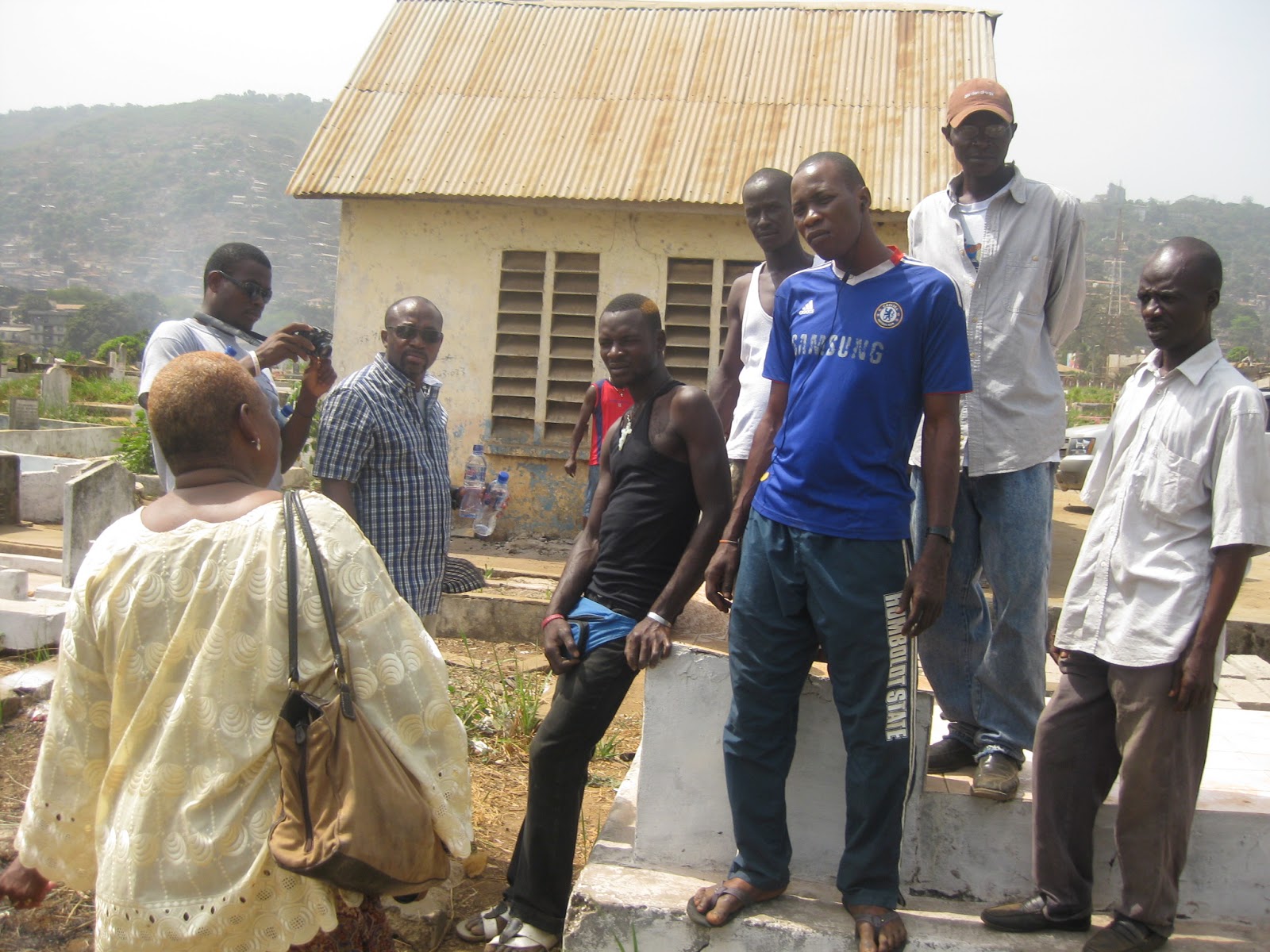 |
| Rick Wilson and Isa Blyden (great granddaughter of Edward Wilmot Blyden) |
One hundred and one years—plus one day—after
Edward Wilmot Blyden died (7 February 1912), my colleague, Olu Q. Menjay, and I
paid respects at his grave. We were in the company of Isa Blyden, great-granddaughter
of the man and preserver of his legacy. She welcomed us to Freetown, Sierra
Leone and gave us the gift a full day as we traced some of Blyden’s steps.
For a month I have been in Liberia, “looking
for Blyden.” Visiting his grave was an important part of the search. Once we
arrived, the find was more significant than I had imagined.
In mid-morning Ms. Blyden met us at our
guest house in Freetown. We immediately set out for the cemetery. Along the way
we passed introductions and staked out some agenda that we hoped to address.
Our conversation was frequently interrupted as Ms. Blyden directed our
attention this way or that, making sure that we saw landmarks old and new that
helped us know where we were.
At one point I commented that “Blyden was
ahead of his time” in reference to his interests and energy. Gently Ms. Blyden
corrected me. “No,” she said, “he lived deeply in his time.” Boom! Perspective
shift.
Of course she is correct. Since her
arresting comment I have turned her words over in different contexts. The
prophets of the Old Testament lived deeply in their times. For three decades I
have tried to impress upon my students that if prophets were only interested in
the future they would have been irrelevant. I often attempt to make the point
that prophets are historians who understand the dynamics that shape the
present. But, because they are visionaries the prophets also have clear
anticipation of how changes in the present can contribute to a future with a
better shape. “They lived deeply in their times,” I will say from now on. That
character is not only part of biblical figures, but of figures in all ages
whose vision effects change.
After nearly an hour we arrived in the
neighborhood of the cemetery. Ms. Blyden had told us that it is called “Racecourse
Cemetery” because in colonial days the British wanted horses and a track in
Freetown. The climate, however, was not equine-friendly. As the horses died the
hope for a racetrack was abandoned. Soon the cleared land became a graveyard.
Today the cemetery is a mess. For some time
the walls have been gone, graves desecrated by vandals, and the few structures
taken over by squatters who call themselves “friends of the dead.” Recent
efforts to rebuild the walls promise some change, but the work is far from
complete. As we pulled in I thought we
had stopped at a dump site. There were mounds of trash, some burning. At first
I thought I saw piles of rubble, but as I focused I realized that I was looking
at gravestones strewn about. My heart sank. “How could have Blyden’s grave
survived over one hundred years,” I wondered.
 |
| Rick Wilson and Olu Menjay at the grave of Edward Wilmot Blyden |
We stopped at a sturdy structure near the
gate. “Here is where Blyden rested before he was buried,” Ms. Blyden told us.
The squatters welcomed us into their claimed space. I could see and easily
imagine how it once was a like a chapel. I was saddened by the debris and signs
of less than reverence in the space, today.
Only a few yards away was Blyden’s grave,
weathered but intact. I surmised that Isa Blyden’s regular visits contributed
to the grave’s condition. She told of memorial visits and vigils and her work
to clean up the whole of Racecourse Cemetery.
 |
| libation at Blyden's grave |
The kola nut meat has a natural seam that allows the nut to be divided into halves; each half has a round and flat side. Olu and I each divided one red and one white nut. Ms. Blyden gave us instructions: “Talk to him as you pour the water on his grave. Ask of him what you might want. Then toss the kola nuts to see what he says.”
 |
| libation at Blyden's grave |
I went first. I spoke with admiration for Blyden’s work and legacy. I cited the passing of the mantle from Elijah to Elisha and Elisha’s request for a “double-portion” of what Elijah had. My request: merely half of what Blyden had. I tossed the kola and all four pieces rested on the rounded sides: Blyden did not hear me, Isa said. I poured more water—rinsing the pieces that brought no response, and tossed them again. This time two pieces—one red and one white—landed on the flat side. “He heard you,” Isa said. We picked up the two pieces that landed on the round side and passed them among us, communion-like, taking a bite of the bitter kola before handing it to the next person.
Olu went next. His petition was eloquent, recalling the struggles of Africans in colonial times, recalling successes and challenges in the present, and voicing hope for days to come. His request was for strength and vision. All four pieces of the kola landed flat side down. “You got everything,” Isa said.
 |
| a lecture for "friends of the dead" |
We left for other sites in Freetown. I wondered whether Blyden would be with us. It was certain the Ms. Isa Blyden was with us. The day ahead was full of insight and passion. Soon I hope to post other markers of the day.
.
This is wonderful, Rick. Many Westerners would not see, much less participate in such an extraordinary experience.
ReplyDelete